The Importance of Grains in Pet Bird Diets
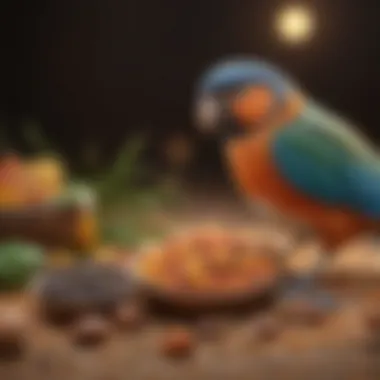
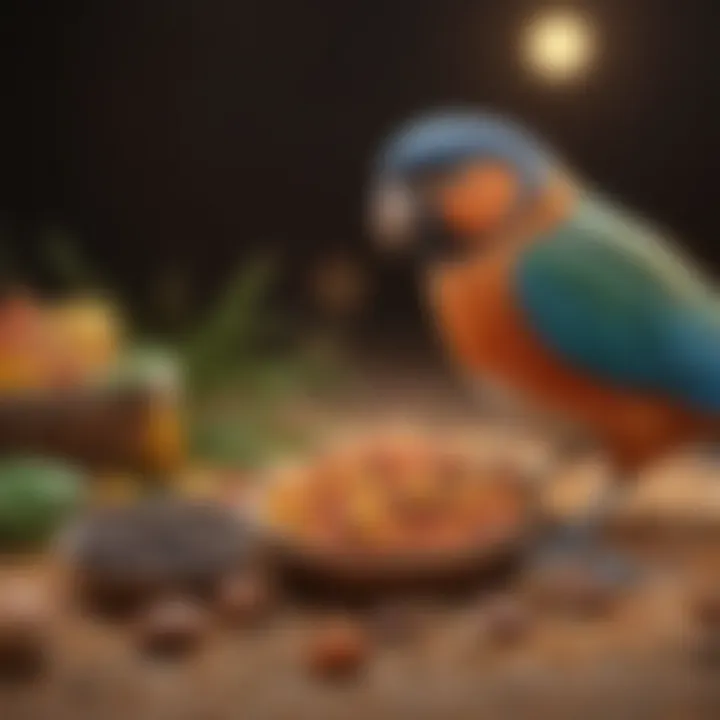
Intro
Birds have unique nutritional needs, and understanding their diets is essential for any pet bird owner. Grains play a crucial role in the diets of many bird species, yet their importance is sometimes undermined or misunderstood. This article aims to shed light on the significance of integrating grains into a pet bird's diet. It will evaluate the types of grains available, their nutritional contributions, specific requirements for different bird species, and preparation methods to ensure safety and digestibility. Moreover, it will address common misconceptions and provide guidance for achieving a balanced intake of grains for optimal health.
Care Tips
Daily Care Routines
Title care routines are vital for maintaining the well-being of your pet bird. A balanced diet is not just about grains but encompasses the entire feeding approach you maintain. Always offer a mix of grains along with fruits, vegetables, and seeds to provide a holistic diet. This diverse strategy mimics a bird’s natural diet, promoting health and vitality.
Cage Setup and Maintenance
The environment where your bird lives directly impacts its health. A spacious cage allowing for flight and movement is essential. Grains should be stored properly to avoid pests and spoilage. Always clean food dishes daily to prevent bacterial growth and ensure your feathers friend stays safe from illnesses.
Hygiene and Cleaning Practices
Maintaining proper hygiene plays a significant role in your bird's overall health. Regularly clean the cage, replacing substrate and discarding old food. Grains that are spilled should be cleaned to avoid attracting pests. Adequate hygiene practices can prevent many health issues in pet birds.
Seasonal Care Adjustments
As seasons change, the dietary needs of your bird may also shift. During colder months, offering higher energy foods, like fatty seeds, can be beneficial. In the warmer months, ensure grains are kept cool and dry, adjusting their quantities to prevent spoilage due to moisture.
Behavioral Insights
Understanding Bird Body Language
Understanding how your pet bird communicates through body language is essential. Observe their movements and sounds, as these indicate their comfort or discomfort levels. A bird's affinity for certain grains may also summon behavioral changes, such as increased energy or a calm demeanor.
Common Behavioral Issues and Solutions
Some behavior problems can arise from improper nutrition. Changes in diet, especially when grains are omitted or poorly managed, could lead to stress, feather plucking, or aggression. Identifying and addressing these issues is crucial to maintaining harmony in your home.
Positive Reinforcement Techniques
Utilizing positive reinforcement while feeding time can encourage your bird to accept grains more readily. Rewarding your pet for trying new foods or for good behavior during feeding can promote healthier habits and enhance your bond.
Social Interaction Needs
Social interaction is paramount for birds. Offering grains as part of shared activities can strengthen your relationship. Engage in play, talking, and other forms of interaction while incorporating grains in a fun way.
Nutrition Guides
Essential Diet Components
In the realm of avian nutrition, understanding essential components is key. Grains provide carbohydrates and some protein, which are fundamental for energy. Diverse grains like millet, oats, and quinoa each offer distinct benefits.
Safe and Toxic Foods
Not all foods are safe for birds. Knowing which grains are acceptable and which are harmful is essential. For example, while millet is a safe choice, chocolate remains toxic to birds and should be avoided entirely.
Supplements and Treats
Adding supplements can enhance the grain component in your bird’s diet, helping to ensure they receive all necessary nutrients. Seek guidance from an avian vet to select appropriate options tailored to your pet's specific needs.
Feeding Strategies for Different Species
Different species of birds have varying dietary requirements. Budgerigars may thrive on a diet rich in small seeds and grains, whereas larger birds may need a broader array of grains and vegetables. Always research the specific needs of your bird species.
Wellness and Health
Routine Health Checkups
Health checkups are a proactive measure to ensure your bird's well-being. Regular vet visits help monitor your pet's health, including its diet and grain consumption.
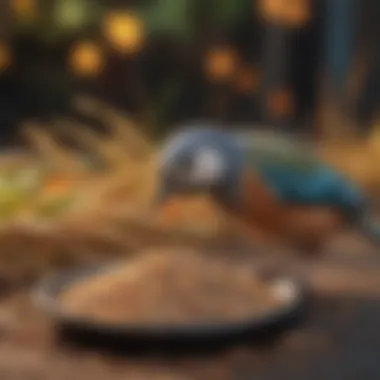
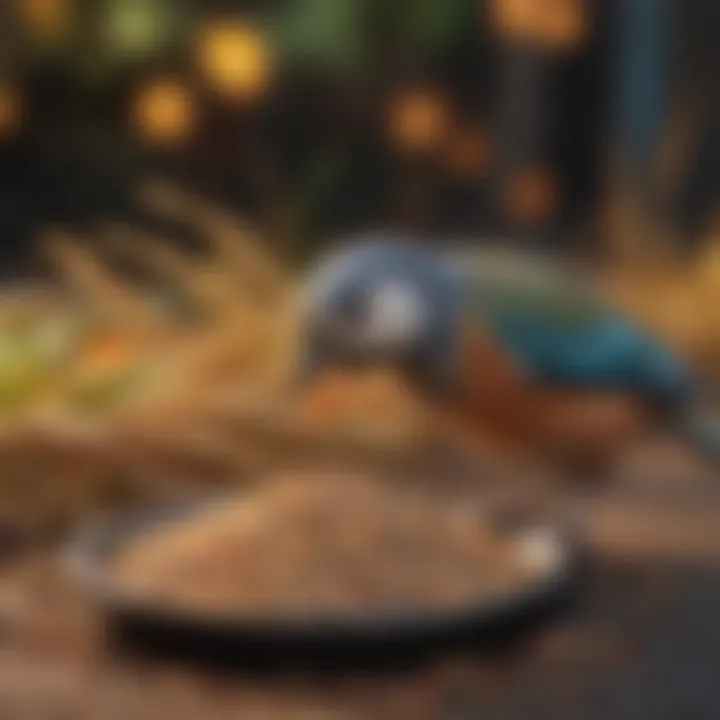
Identifying Symptoms of Illness
Being vigilant in observing your bird’s behavior is crucial. Changes in activity, feather condition, or feeding habits could signal a health issue. Identifying these symptoms early can lead to better outcomes.
Preventative Care and Vaccinations
Preventative care should include vaccinations where relevant. Discuss with your veterinarian which vaccinations are necessary for your bird's species and ensure they receive them on schedule.
Mental and Emotional Well-being
A bird's emotional health is just as important as its physical health. Providing varied diets that include grains feeds their natural curiosity and prevents boredom, contributing to overall mental well-being.
Enriching Activities
Toys and Playtime Ideas
Interactive toys that reward birds with grains can stimulate mental activity. While grains are a key part of their diet, combining them with play can enhance their engagement.
Training and Tricks
Training birds in a positive manner can encourage them to try new foods. Use grains as rewards during training sessions to foster a cooperative and entertaining learning environment.
Outdoor Activities and Interaction
Exposure to the outside world can be beneficial for birds. Create opportunities for supervised outdoor time where they can interact with grass and nature, enhancing their appreciation for varied experiences, including grain types.
DIY Projects for Mental Stimulation
Building simple projects that involve grains can provide both exercise and stimulation. Crafting foraging toys using grains encourages natural behaviors while keeping your pet active and engaged.
Grains are not just fillers in a bird's diet; they are essential components that serve numerous nutritional benefits. Understanding how to integrate grains into your pet's diet can lead to healthier and happier avian companions.
Intro to Pet Birds and Their Dietary Needs
The dietary needs of pet birds are critical to their overall health and well-being. Unlike cats or dogs, birds have distinct nutritional requirements that must be met for optimal growth, energy, and vitality. Understanding these dietary needs lays the foundation for a robust care routine. This section will serve to illuminate why grains play a pivotal role in avian diets, addressing the balance necessary for bird upkeep.
Overview of Common Pet Bird Species
Common pet birds include species such as parrots, canaries, budgerigars, and cockatiels. Each of these species exhibits unique dietary preferences and needs. For instance, parrots require a more varied diet enriched with nuts and seeds, while canaries thrive on a seed mixture.
- Parrots: They are known for their intelligence and require a diet rich in fruits, vegetables, and high-quality grains.
- Canaries: Primarily seed eaters, their diet is best supplemented with green foods and occasional grains.
- Budgerigars: These small birds have a diverse appetite, enjoying seeds, fruits, and vegetables.
- Cockatiels: Typically opt for seeds, but also benefit from grains and leafy greens.
Each species has its preferences which impacts their overall nutritional intake. Understanding these preferences helps pet owners provide a balanced and healthful diet essential for their pets' well-being.
General Dietary Requirements
Pet birds require a careful blend of various food groups. A balanced diet typically includes:
- Seeds and Grains: These are crucial for energy and essential nutrients. Grains like millet and quinoa can contribute to a healthy diet.
- Fruits and Vegetables: Fresh produce offers vitamins, minerals, and hydration. A mixture of colorful options is often beneficial.
- Proteins: Sources such as cooked beans, eggs or specific high-protein seeds can support muscle development.
It is vital to remember that birds are typically granivorous. This means grains make up a large part of their regular consumption.
Compiling these elements ensures that pet birds receive a wide range of nutrients necessary for their health while preventing nutritional deficiencies. Meeting these dietary requirements will promote not just physical health, but also enhance mental stimulation and social behaviors in pet birds.
The Role of Grains in Avian Nutrition
Grains play a critical role in the overall nutrition of pet birds. Understanding their specific contributions helps bird owners formulate balanced diets. Grains are a source of energy and provide essential nutrients necessary for maintaining health. In this section, we will discuss the nutritional value of grains, explore their role in the natural diets of birds, and highlight the considerations that pet owners should bear in mind.
Nutritional Value of Grains
Grains are often valued for their macronutrient and micronutrient profiles.
Macronutrients
Macronutrients like carbohydrates, proteins, and fats are crucial for energy, growth, and reparative processes in birds. Grains chiefly provide carbohydrates, which serve as an energy source. This energy supports the metabolism and overall activity level of pet birds.

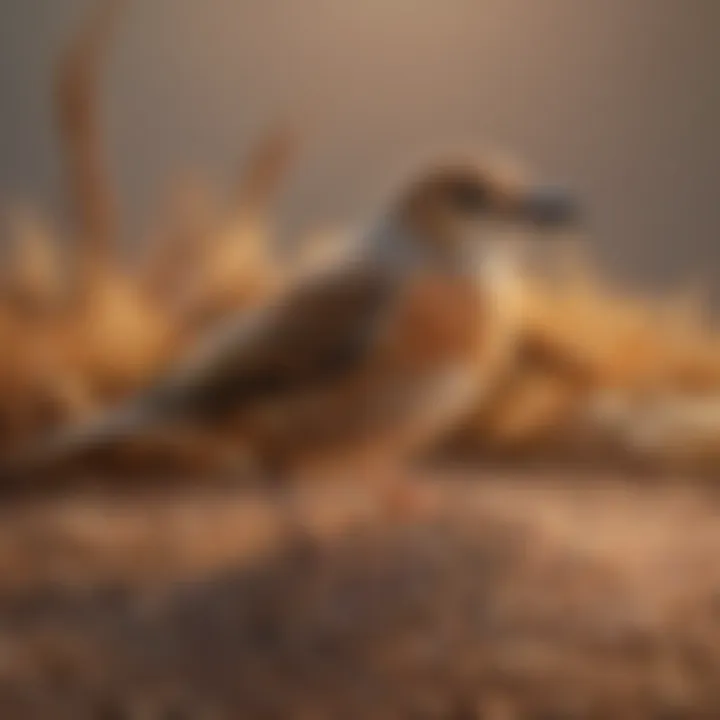
The high carbohydrate content in grains such as millet and quinoa makes them a favorite among bird owners and their pets. These grains are easily digestible and help in maintaining stable energy levels throughout the day. Additionally, some grains contain proteins that contribute to muscle development and feather maintenance. However, it is worth noting that not all grains contain the same amount of proteins. The protein content of grains is generally lower compared to other food categories like legumes or seeds, so a balanced approach considering various food types is necessary.
Micronutrients
Micronutrients, including vitamins and minerals, are vital for avian health but required in smaller amounts compared to macronutrients. Grains can offer a range of these essential nutrients. For example, whole grains often contain B vitamins that assist in energy metabolism.
Another significant feature of micronutrients in grains is their role in promoting immune function. These nutrients help birds combat diseases and support overall health. However, it is important to provide a variety of grains to ensure that birds receive a comprehensive range of micronutrients. Not all grains are richly endowed; thus, some might lack certain vitamins or minerals. Bird owners should complement grain intake with other foods like fruits and vegetables to create a more balanced diet.
Natural Feeding Habits of Birds
Understanding the natural feeding habits of birds offers insights into incorporating grains into their diets effectively. Wild birds typically consume a diverse array of seeds, fruits, and insects, each offering unique nutritional benefits. Grains replicate a portion of this diet but must be given consideration to promote health.
Pet birds might favor specific grains due to habit or preference. This can affect their overall nutritional balance and health. Observing which grains your pet bird enjoys can help ensure they receive adequate nutrition. Some birds may have different preferences based on species, age, and individual taste, making it crucial for owners to offer a variety of grains as part of their diets.
Key Insight: Grains can stimulate natural behaviors in pet birds, encouraging foraging and exploration. This activity is important not only for nutrition but also for mental stimulation.
Types of Grains Suitable for Pet Birds
Choosing the right types of grains for pet birds is fundamental in ensuring their overall health and well-being. Grains are a major source of energy and play a vital role in avian nutrition. They are rich in essential nutrients that are necessary for various physiological functions. When selecting grains for birds, consider the specific needs of different species and their natural feeding habits. This section aims to highlight both the common grains suitable for pet birds and those that should be avoided.
Common Grains and Their Benefits
Millet
Millet is one of the most common grains offered to pet birds. It is small, round, and easily accessible, making it a popular choice among bird owners. This grain is particularly favored due to its high digestibility and palatability. Millet provides a good source of carbohydrates and essential fatty acids. It is also low in calcium, which is beneficial for certain bird species that require a balance of minerals in their diet. However, millet should be balanced with other grains and seeds to avoid an overly high-fat content in the diet.
Canary Seed
Canary seed is another valuable option for pet birds. Originally cultivated for canaries, it has a high-fat content and is rich in protein. This grain is also known for its stimulating characteristics, which make it an excellent choice for breeding birds or those in need of extra energy during molting. However, its high-fat content means it should be fed in moderation to prevent obesity in less active birds. Providing items in their whole form can help maintain interest and engagement during feeding.
Oats
Oats are a versatile grain that can be beneficial for pet birds. They are a good source of fiber, important for digestive health. Furthermore, oats contain a range of vitamins and minerals. They can be offered in numerous forms, including rolled or steel-cut. Oats are often more appreciated by birds when cooked slightly or soaked before feeding, as this makes them easier to eat and digest. Be cautious, though; excessive oats can lead to a high calorie intake, so they should not be the sole grain in the diet.
Quinoa
Quinoa is gaining popularity as a nutritious grain for pet birds. It has a unique profile, being high in protein and containing a complete set of amino acids, which is rare for grains. Quinoa is gluten-free and can provide essential nutrients such as magnesium and potassium. Its texture and slight crunch can attract birds' curiosity. However, it must be thoroughly rinsed and cooked prior to feeding to remove saponins, which can cause digestive issues.
Grains to Avoid
Avoiding certain grains is as important as selecting the right ones for pet birds. Some grains may not provide adequate nutrition or may even pose health risks. For example, corn is often high in sugar and should be fed sparingly. Brown rice, though generally considered healthier than white rice, can be harder for some birds to digest due to its fiber content. Additionally, grains with a mold or fungus risk, such as older stored grains, can lead to serious health issues. It’s essential for bird owners to be knowledgeable about what grains to include and which to leave out for a balanced diet.
Preparing Grains for Pet Birds
Preparing grains for pet birds is vital to ensure their health and wellbeing. The right preparation enhances nutritional value and makes grains more digestible and safer for consumption. Properly prepared grains can significantly boost the overall diet of pet birds by providing them essential nutrients while avoiding potential health issues. Let's explore various preparation methods that can maximize the benefits of grains in avian diets.
Soaking and Sprouting
Soaking grains before feeding can help activate enzymes. This process can increase the bioavailability of some nutrients. The grains soften, making it easier for birds to consume them. After soaking, many bird owners choose to sprout the grains. This involves rinsing the soaked grains daily and allowing them to germinate. Sprouting enhances nutritional density, making vitamins and minerals more accessible.
In addition, sprouted grains often contain higher levels of protein compared to unsprouted ones. This is beneficial, particularly for growing birds that require protein to support their development. By incorporating soaked and sprouted grains into their diet, birds can gain improved nutrition and increased energy levels.
Cooking Methods
Boiling
Boiling grains is a commonly used method to prepare them. This technique works by immersing grains in hot water. The heat effectively softens the grains, making them easier to digest for pet birds. One key characteristic of boiling is that it maintains the texture of the grains while making them safer to consume.
Many bird owners favor boiling due to its simplicity and effectiveness. However, it is essential to monitor cooking time, as overboiling can lead to nutrient loss. If grains are boiled too long, they can become mushy, which may not be appealing to some birds. Therefore, attention to detail is necessary when using this method.
Steaming
Steaming is another excellent option for preparing grains. This method cooks grains using steam without direct contact with water. This allows the grains to retain more significant amounts of nutrients compared to boiling. One of the unique features of steaming is that it preserves both texture and flavor. As a result, many pet birds tend to enjoy steamed grains more than those that are boiled.
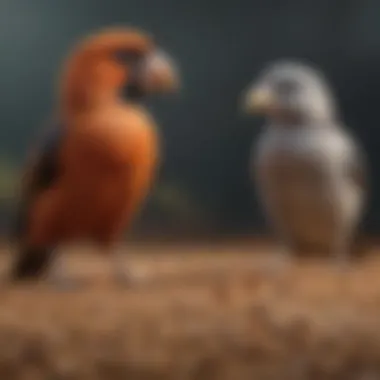
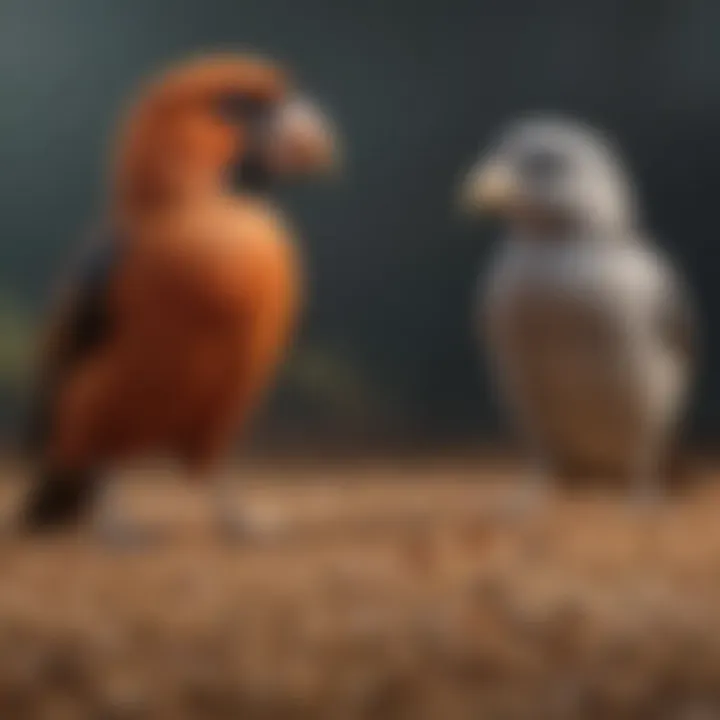
While steaming is very effective, it can require specialized equipment. However, the benefits often outweigh the additional effort. Properly steamed grains can keep their nutritional value intact while providing a delightful experience for birds at mealtime.
Storage Considerations
Storing grains properly is crucial to maintaining their freshness and preventing spoilage. Grains should be kept in airtight containers in a cool and dry environment. The proper storage extends the shelf life and ensures that birds receive the best quality food.
Keep grains out of direct sunlight, as this can cause deterioration. Additionally, regular inspections should be conducted to look for signs of mold or pests. Appropriate storage not only safeguards grains but also enhances the overall health and wellbeing of pet birds.
Proper preparation and storage of grains can greatly improve the nutrition of pet birds.
Balancing Grains with Other Dietary Components
Grains play an essential role in the diet of pet birds, yet they should not be the sole component. Balancing grains with other dietary elements is vital for ensuring that birds receive a varied and nutritious diet. A well-rounded approach helps meet the specific needs of different species, leading to better health and longevity.
Fruits and Vegetables
Fruits and vegetables are integral components of a balanced diet for pet birds. These foods provide essential vitamins, minerals, and antioxidants that grains alone do not sufficiently offer.
- Vitamins: Many fruits and vegetables are high in vitamin A, vitamin C, and several B vitamins, which are crucial for maintaining a bird's immune system and overall health.
- Fiber: Fresh produce supplies the necessary fiber for digestive health, which aids in preventing issues such as obesity and gastrointestinal problems.
- Hydration: Fruits, particularly, are high in water content, helping to keep birds hydrated, especially in warmer climates.
Some fruits and vegetables that are safe for most pet birds include carrots, broccoli, apples, and leafy greens. It's important to ensure that these are fresh and, when possible, organic to avoid the risk of pesticide exposure. Birds should always be gradually introduced to new foods to avoid digestive upset.
Proteins and Fats
In addition to grains and produce, proteins and fats are crucial for a bird’s diet. These nutrients are used for energy and play a role in maintaining healthy feathers and overall growth.
- Proteins: Sources like cooked eggs, legumes, and certain seeds are excellent for providing the necessary amino acids that birds need for muscle development and repair. Some birds may require more protein, especially during periods of molting or breeding.
- Healthy Fats: Fats should come from sources like seeds, nuts, and specific oils (such as flaxseed oil). Omega-3 fatty acids, found in these foods, support cardiovascular health and cognitive function.
It is important to monitor portion sizes when feeding proteins and fats. Over-supplying these can lead to obesity and other health issues. Always observe your bird's reactions to different foods, adjusting the diet based on their preferences and health needs.
Addressing Common Myths About Grains
In the context of pet birds, grains occupy a pivotal role in their diet. However, several myths persist regarding their nutritional value and implications for bird health. It is essential to dismantle these misconceptions to ensure that bird owners are well-informed about the benefits and proper usage of grains. A clear understanding can aid in crafting a balanced diet that supports overall wellbeing.
Grains and Obesity Myths
One prevalent myth is that feeding grains to birds leads to obesity. This concern arises primarily from observing weight gain in pet birds when their diet is not properly balanced. It is critical to understand that grains, when included in moderation and as part of a varied diet, are not inherently fattening.
The reality is that obesity in pet birds often stems from overfeeding and lack of exercise rather than grains themselves. Grains provide essential carbohydrates and energy, which can support an active lifestyle for many avian species. A proper emphasis on portion control is necessary, along with incorporating fresh fruits, vegetables, and proteins. Bird owners should monitor their pet's weight periodically and adjust their diet based on their findings. The following points help clarify the question of obesity and grain intake:
- Grains should only comprise a portion of the total diet, around 10-30%.
- Variety is key; mixing different grains with fresh produce enhances nutritional value.
- Regular exercise is vital for maintaining healthy weight in pet birds.
"A well-balanced diet that includes grains can actually promote better health when well managed."
Digestibility Concerns
Another common misconception is that grains are difficult for birds to digest. This belief can deter owners from integrating grains into their pet's diet. However, when prepared correctly, grains can be highly digestible and nutritious. It's important to recognize that different species of birds may have varying digestive capabilities. Some birds, like parrots and finches, can handle whole grains quite well, while others may benefit from grains that are soaked or sprouted.
Soaking grains not only enhances digestibility but also boosts their nutrient profile. Sprouted grains can be even better, as sprouting may increase the availability of vitamins and minerals. It is advisable to explore preparation methods that suit your specific type of bird, taking note of individual preferences and health needs. Consider the following points when thinking about digestibility:
- Always choose high-quality grains that are free from mold and contaminants.
- Try introducing new types of grains slowly to observe any digestive reactions.
- Consult with an avian vet if there are significant concerns about your bird's diet or digestion.
Ultimately, understanding the truth about grains and their role in your bird's diet allows for improved health outcomes and balanced nutrition.
End: The Importance of Grains in Avian Diets
In the management of pet bird health, understanding the role of grains is pivotal. Grains provide a mixture of essential nutrients. These nutrients promote health and vitality in birds. A balanced diet contributes to their overall well-being. Without adequate grains, pet birds may face nutritional deficiencies.
Grains are a significant source of energy. They contain carbohydrates that are crucial for support in daily activities. This includes flying, foraging, and general movement. Additionally, grains contribute protein and fats, albeit in smaller amounts.
Proper grain intake helps combat issues like obesity and poor feather health.
The right balance can enhance the quality of life for pet birds.
Moreover, different species of birds have unique dietary needs. For instance, some species may disproportionately benefit from certain grains. Millets are often favored by finches, while parakeets may thrive with a blend that includes oats.
Preparation methods also influence the nutritional value of grains. Sprouting and soaking grains can enhance digestibility and bioavailability. Educating bird owners on these options empowers them to make informed choices.
Final Thoughts on Nutritional Balance
To maintain a healthy diet for pet birds, a nutritional balance is essential. Grains should complement other dietary components, including fruits, vegetables, and proteins. This mix ensures that birds receive varied nutrients, which is crucial for their growth and health.
Spending time to understand which types of grains to include can make a significant difference. Bird owners should also focus on the variety and freshness of the grains they offer. Ultimately, the goal is to create a well-rounded diet that covers all dietary needs. By paying attention to grains and their role, pet bird owners can significantly improve the life quality and longevity of their avian companions.















